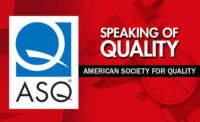You have goals for your improvement projects. You also want clear goals for your career development plan. However, as the world changes at an ever-increasing rate, it can be difficult to see the career target you’re aiming for. By taking a look at the ASQ Future of Quality Study we can get a glimpse into the future of the quality profession and how it will impact your career.
As part of the 2011 ASQ Future of Quality Study, the 140-plus panel of experts was asked to offer thoughts about the quality profession. Many of the comments submitted were not unique to the 2011 study. In total, the responses made clear that we’re getting closer to the future predicted for years. Now, urgent action is needed. You can be in a position to effect real change throughout your organization. It is about readying yourself for the future of the profession. It is about career development.
When ASQ launched the Future of Quality Study in 1996, quality had just started moving outside of the quality department and into other parts of the organization. Quality was still product focused. Sixteen years later, we speak openly of organizational quality. The career path of the quality professional was changing in both expected and unexpected ways.
Here we are 16 years—and six studies—later. Where is the quality professional within the bigger business landscape? How should you react to what the panel had to say (grouped together in common areas from the verbatim responses) about the quality professional? We begin by offering the panel’s suggestions of what to do to advance your career, how to approach the future as a leader and why it matters:
- Quality professionals will need to be willing to significantly change the way in which they think of their jobs and themselves.
- Stand-alone quality departments could very well be things of the past.
- The dwindling department does not spell doom for the quality professional. On the contrary, this is good news. There will be more opportunities for the quality professional in management.
- Quality professionals move into higher levels of the organization with more decision power.
- Knowledge in the humanities (psychology, sociology), business management, and knowledge transfer, will be essential.
- While the workforce continues to age, retire, or move to other professions, it is a good time for quality professionals to become coaches for organizations as well as mentors for young workers.
- Think strategically. Lead holistically.
You undoubtedly noticed the words change, leadership, strategic, and opportunities peppered throughout these bulleted insights. A bright future can be had, but it will not arrive by coasting. If you are unwilling to change your way of thinking and broaden your skill set to include the language of business and leadership, you will become obsolete. It is the harsh reality of the ever-changing, accelerating world we live in.
Quality professionals and practitioners speak in statistics, but to make that leap into upper management, communicating quality in terms of business strategies is a must. It goes beyond making the economic case for quality. Quality doesn’t simply fit into the organization, quality is the organization. Make sure everyone realizes that.
By nature of the tasks within the profession, quality professionals examine details. Details can be seen as antithetical to the big picture—the strategy. Don’t let that line of thinking cloud your career path. Get strategic. Think beyond your job, department, product, service and even organization. Quality is an important aspect of daily living. In the case of your organization, know the big strategies and get yourself to the table.
Although you don’t need an MBA to speak business language, ASQ’s 2012 QP Annual Salary Survey does show that an MBA can be a solid career move. Continuing education often does result in an increased salary. While the survey has—over its 26 years—offered strong evidence that certifications do increase the quality professional’s salary, it hasn’t been until this year that general education has been discussed.
You need to understand ROI, margin, bottom line, triple bottom line, along with some psychology and sociology to fully communicate with leadership and staff. Improving personal and interpersonal skills also play an important role in career development. In other words, keep up with the hard side (tools, processes) and don’t forget the soft side (communication, etc.) of quality for a lengthy, fruitful professional career.
The 2011 ASQ Future of Quality Study can be found on the ASQ website at http://rube.asq.org/asq.org/2011/09/global-quality/emergence-2011-future-of-quality-study.pdf. The 2012 edition of the Quality Progress Annual Salary Survey (published since 1987) can be found at http://asq.org/qualityprogress/index.html.

